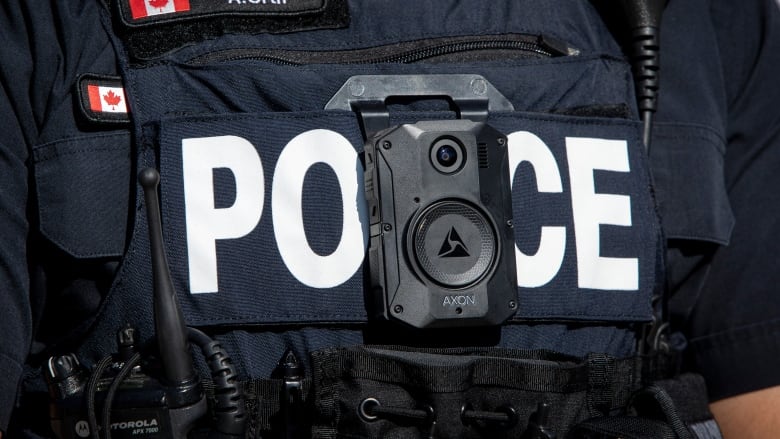Cornwall police officers now wearing body cameras
Cameras will record every interaction with a member of the public, force says

Officers with the police force inCornwall, Ont., are now wearing body cameras while on duty, joining a growing number of police agencies in eastern Ontario but notOttawa.
The Cornwall Police Service (CPS) launched the first phase of the program Wednesday after itsboard voted to purchase the cameras in January.
While a select group of officers on each shift will be equipped with the devices to start, all 54 front-line patrol officerswilleventually be outfitted, according to a CPS media release.
Like other cities across Ontario, Cornwall has seen anincrease in violent crimes, thefts and calls for mental health crises, said Insp. Chad Maxwell.
With that, he added, comes more investigations, prosecutions and complaints.
Earlier this year, the city's police service board heard there hadbeen 86 public complaints since 2018. Twenty-threerequired an investigation by the board, with an average of 40 hours spent per investigation.
"This modernization no doubt improves our service delivery. I think it creates efficiencies both at the police department as well as the criminal judiciary system where we're presenting evidence," Maxwell told CBC.
"It really does provide a true, unaltered and unbiased version of events as they take place."
CPS officers will be required to record all interactionswith the public while they're conducting investigations. The cameras will emit a sound every two minutesand will flash a red LED light so people know it's recording.
Anyonecharged with an offence will be entitled to the footage.
The CPS is one of a growing number of police forces across Ontario to start wearing cameras, including those inBrockville, Belleville, Akwesasne and Toronto.
The Ottawa Police Service (OPS) is one of the only agencies in eastern Ontario that does not.
In a news release earlier this month, the force said it will eventually launchan in-car camera pilot project. Those cameras will be equipped with microphones to capture audio when an officer gets out of their vehicle.
OPSdid not answer CBC's questions about whether it everintends toimplement body cameras.
Body cameras inevitable, says expert
People have long debated whether police should wear cameras while on duty, with some arguing that there's little evidence the technology influences how officers behave.
But one localexpert believes every force in the country will eventually incorporate camerasinto their operations.
"We won't have this conversation in 10 years because everybody will have had them for years and years and it'll just be a normal thing," said Gregory Brown, a professor of legal studies at Carleton University.
Brown, who was also a former member of the OPS, has done extensive research into the use of body cameras by front-line officers.
He said the benefits of using the technology outweighany argument against them withcost being the big one.
Body cameras aren't cheap, he said, and neitheris training officers to use them nor maintaining thestorage needed to save footage.
The CPS spent at least $159,000 for cameras that will need to be replaced every three to five years.
Despite the financial outlay for the cameras, Brown said theynot only do more to ensure officers perform their duty on their best behaviour, but alsosaves them from "false complaints," said Brown.
Cell phone video filmed by bystanders often misses the entirety of an interaction between a person and a police officer, he said, while body cameras give police their own independent recording of what happened.
With files from Faith Greco













_(720p).jpg)


 OFFICIAL HD MUSIC VIDEO.jpg)
.jpg)



























































































